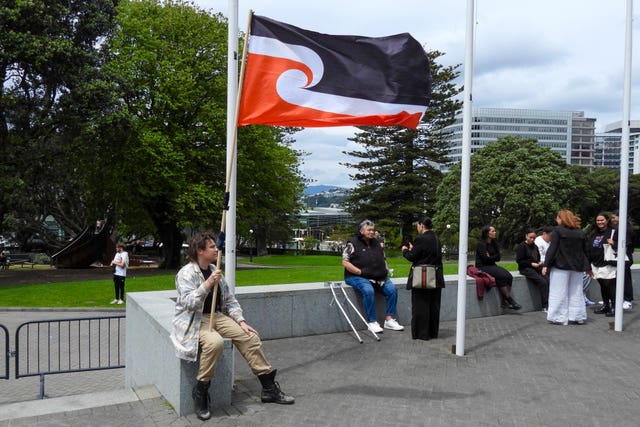Parliament to debate suspending Maori politicians who performed protest haka
The haka is a chanting dance of challenge of great cultural importance in New Zealand.

A New Zealand parliamentary committee has recommended the unprecedented suspensions of three Maori politicians for performing a protest haka in the debating chamber last year.
The haka is a chanting dance of challenge of great cultural importance in New Zealand, and the three politicians from Te Pati Maori, the Maori party, performed one to oppose a Bill that would have redefined the country’s founding document.
A committee on Wednesday recommended record suspensions and severe censure — the harshest penalties ever assigned to New Zealand parliamentarians — after finding the trio in contempt of parliament.
Government bloc politicians, who hold the majority, are expected to endorse the penalties in a vote on Tuesday.

But parliament’s speaker Gerry Brownlee took the unusual step on Thursday of saying that he would first allow unlimited debate before the vote due to the severity of the proposed punishments.
The recommendations were the latest twist in the fraught saga over the Bill, now defeated, that opponents said would have provoked constitutional havoc and reversed decades of progress for Maori, New Zealand’s indigenous people.
Video of the legislators in full cry drew global attention last November.
The Bill they opposed was vanquished at a second vote in April.
But some politicians from the centre-right government objected to the Maori Party legislators’ protest during the first vote and complained to parliament’s speaker.
At issue was the way the trio walked across the floor of the debating chamber towards their opponents while they performed the haka.
“It is not acceptable to physically approach another member on the floor of the debating chamber,” Wednesday’s report said, adding that the behaviour could be considered intimidating.
The committee denied the legislators were being punished for the haka, which is a beloved and sacred cultural institution in New Zealand life, but “the time at and manner in which it was performed” during a vote, according to the findings.
The committee deciding the fate of the politicians has members from all political parties. The government’s opponents disagreed with parts or all of the decision but were overruled.
“This was a very serious incident, and the likes of which I have never seen before in my 23 years in the debating chamber,” the committee’s chair, Judith Collins, said.
The three legislators did not appear before the committee when summoned in April because they said parliament did not respect Maori cultural protocol and they would not get a fair hearing.
“The process was grossly unjust, unfair, and unwarranted, resulting in an extreme sanction,” Maori party spokesperson and politician Mariameno Kapa-Kingi said in a statement.
“This was not about process, this became personal.”
The report recommended that Hana-Rawhiti Maipi-Clarke, who at 22 is New Zealand’s youngest politician, be suspended from parliament for seven days. The co-leaders of her political party, Rawiri Waititi and Debbie Ngarewa-Packer, face 21-day bans.
Three days is the longest a politician has been barred from the house before. Suspended legislators are not paid during their bans.
Mr Waititi and Ms Ngarewa-Packer, the leaders of the party that advocates Maori rights and holds six of parliament’s 123 seats, have lambasted the committee’s process as intolerant of Maori principles and identity.

The pair received more severe sanctions than Ms Maipi-Clarke because the younger politician had written a letter of “contrition” to the committee, the report said.
The Principles of the Treaty of Waitangi Bill sought to redefine New Zealand’s founding document, the 1840 pact between the British Crown and Maori leaders signed during New Zealand’s colonisation.
The English and Maori language versions of the treaty differed, and the Crown immediately began to breach both, resulting in mass land thefts and generations of disenfranchisement for Maori, who remain disadvantaged on almost every metric.
But in recent decades, Maori protest movements have wrought growing recognition of the treaty’s promises in New Zealand’s law, politics and public life.
This produced billion-dollar land settlements with tribes and strategies to advance indigenous language and culture.
Such policies were the target of the Bill, drawn up by a minor libertarian party who denounced what they said was special treatment for Maori as they tried to rewrite the treaty’s promises.





